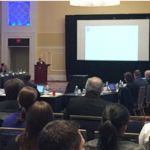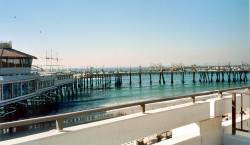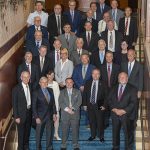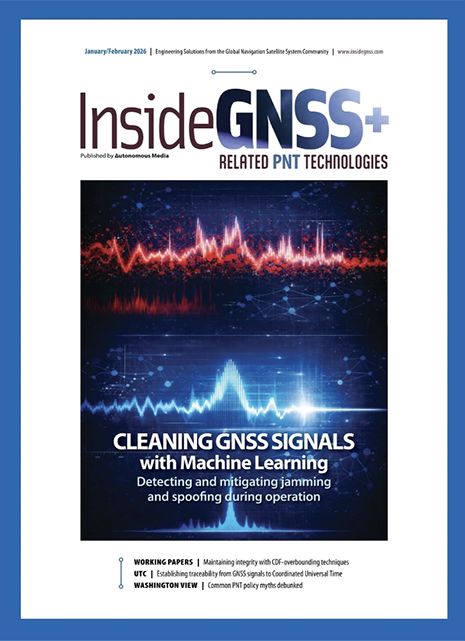President Bush’s appointment of retired U.S. Coast Guard Vice Admiral Thomas Barrett as Acting Deputy Secretary of Transportation has brought a new co-chairman to the U.S. Space-Based Positioning, Navigation, and Timing Executive Committee (PNT EXCOM).
President Bush’s appointment of retired U.S. Coast Guard Vice Admiral Thomas Barrett as Acting Deputy Secretary of Transportation has brought a new co-chairman to the U.S. Space-Based Positioning, Navigation, and Timing Executive Committee (PNT EXCOM).
Barrett arrived in March just ahead of the first meeting of a new 24-member advisory committee and with the first allocation for Department of Transportation (DoT) funding of the new GPS civil L1 (L1C) signal working its way through Congress.
The advisory board, established by NASA on behalf of the EXCOM, is chaired by James Schlesinger, who has served in past administrations as secretary of defense, head of the energy department, and CIA director. Brad Parkinson, a Stanford University professor emeritus and the first director of the GPS Joint Program Office, serves as vice-chair of the group, which includes six international members.
The March 29–30 gathering of advisors was dedicated to organizational matters and a series of background briefings on “PNT challenges and opportunities” by EXCOM agency representatives, GPS status and modernization reports from U.S. EXCOM officials, and the president’s 2004 PNT policy, by Philip Ritcheson, director of space policy for the National Security Council.
Barrett, a 36-year Coast Guard veteran, has served as administrator the Pipeline and Hazardous Materials Safety Administration since May 2006, a position he will retain in addition to DoT deputy secretary. Barrett replaces Maria Cino, who left the position to serve as the Chief Executive Officer of the Committee on Arrangements for the 2008 Republican National Convention.
DoT Seeks L1C Funds
A $7.2 million dollar item in the president’s Fiscal Year 2008 (FY08) Department of Transportation budget proposal, split between the Federal Aviation Administration and the Federal Highway Department, would pay the first installment on the L1C signal planned for implementation under the GPS III program. The total five-year civil contribution for the new signal is expected to be more than $200 million.
Under a 2006 proposal from a bilateral (United States/European Union) technical working group, L1C will have a similar design as Europe’s Galileo Open Service (OS) signal. (See the overview article on L1C by the engineering team that designed it, beginning on page 42 of this issue.) First launch of a GPS Block III satellite is currently expected in 2013. Galileo’s OS signal will probably begin broadcasting on the second in-orbit validation (IOV) experimental satellite (GIOVE-B) planned for launch in December. Four Galileo IOV satellites will begin launching in 2009.
The DoT funds would underwrite system engineering analysis and prototyping in a research partnership with the Department of Defense for the L1C to meet civil integrity monitoring requirements. This would include prototyping of a GPS satellite time keeping system capable of meeting civil clock integrity requirements, according to the FAA’s 2007 National Aviation Research Plan.
Bush’s 2004 National Security Directive on Space-Based PNT mandated that any future GPS improvements designed for non-military users be funded by civil agencies.
Advisory Board Members
The 2004 directive also authorized formation of the advisory board, which will be staffed by Diane Rausch, a NASA representative in the PNT National Coordination Office that supports the EXCOM. The board will operate in accordance with the Federal Advisory Committee Act, providing advice about U.S. space-based PNT policy, services, planning, and program management.
In addition to Schlesinger and Parkinson, the advisors are:
Phil Boyer, Aircraft Owners and Pilots Association; Captain Joseph Burns, United Airlines; Ann Ciganer, U.S. GPS Industry Council and vice-president of government affairs at Trimble Navigation; Susan Cischke, Ford Motor Company; Per Enge, professor, Stanford University; Martin Faga, Former President and CEO of MITRE; Keith Hall, Booz-Allen Hamilton; and Robert Hermann, Global Technology Partners, LLC.
Chester Huber, OnStar Corporation; David Logsdon, U.S. Chamber of Commerce; General Lance Lord, USAF (Ret.), Former Commander, Air Force Space Command; General James McCarthy, USAF (Ret.), professor, U.S. Air Force Academy; Terry McGurn, private consultant and a retired CIA employee; Tim Murphy, The Boeing Company; Ruth Neilan, NASA Jet Propulsion Laboratory; Charles Trimble, chairman, U.S. GPS Industry Council.
International members of the advisory board are the following: Gerhard Beutler, International Association of Geodesy (Switzerland); Arve Dimmen, Norwegian Coastal Administration (Norway); Suresh V. Kibe, Indian Space Research Organization (India); Keith McPherson, Airservices Australia (Australia); Hiroshi Nishiguchi, Japan GPS Council (Japan); Captain Richard A. Smith, Royal Navy (Ret.), International Association of Institutes of Navigation (UK).
Copyright 2007 Gibbons Media and Research LLC





